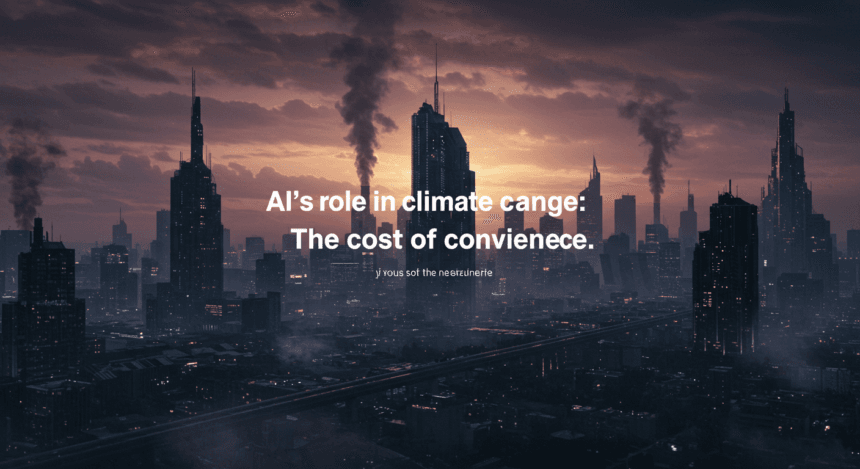We have talked about a lot of the upsides of AI, but there are some downsides too. We mentioned that there are still jobs humans do better than AI. But there are also issues with climate change that AI has caused.
While big data can help the planet, it can also create climate change problems. AI is increasingly becoming a major contributor to the global carbon footprint. In an article published by Melissa Heikkilä for MIT Technology Review, she highlights the growing environmental concerns surrounding the energy consumption of AI technologies, particularly large machine learning models.
“But there’s one thing people aren’t talking enough about, and that’s the carbon footprint of AI. One part of the reason is that big tech companies don’t share the carbon footprint of training and using their massive models, and we don’t have standardized ways of measuring the emissions AI is responsible for. And while we know training AI models is highly polluting, the emissions attributable to using AI have been a missing piece so far. That is, until now,” Heikkilä writes.
Training these models requires vast amounts of computational power, which in turn demands energy from data centers that often rely on fossil fuels. As AI adoption accelerates across industries, the environmental impact continues to grow, with the need for more powerful algorithms and larger datasets driving up electricity consumption and greenhouse gas emissions. This puts the onus on AI startups to address this issue and find ways to minimize the carbon footprint associated with their innovations.
In addition to this concern, major tech companies are seeing their emissions rise despite efforts to reduce them. Google, for example, reported that its greenhouse gas emissions increased by 48% from 2019 to 2024, largely driven by the energy-intensive nature of its AI operations. As AI continues to grow in complexity and use, startups in the sector must take proactive steps to counterbalance their environmental impact. By integrating carbon reduction strategies, adopting renewable energy sources, and developing more energy-efficient AI models, these companies can not only help combat climate change but also lead the way in making the tech industry more sustainable.
Companies increasingly see the global economy’s switch towards sustainability as an environmental obligation and an opportunity for business gain.
The cost savings, new revenue opportunities, and market competitiveness they can bring are significant enough to reduce carbon emissions.
This article discusses the financial benefits of carbon reduction strategies and why companies should focus on sustainability in their business models.
Why You Should Invest in Carbon Reduction Strategies
Carbon reduction strategies were perceived as entirely benefiting the environment until other discoveries were made. The following are some financial benefits associated with using carbon reduction strategies.
Lower energy and operational costs
One of the most immediate financial benefits of carbon reduction is the reduction in energy costs. Energy efficiency in moving energy from the atmosphere to fluids in a machine or from fluid to fluid is of ultimate importance.
Investing in upgrades from incandescent bulbs to LEDs, optimizing heating and cooling systems, or switching to renewable energy sources can reduce electricity bills.
Investing in solar and wind power saves money by reducing the volatility of fossil fuel prices and ensuring that the investments are paid for upfront.
Adding green fuel can reduce fuel and maintenance costs relative to gasoline or diesel vehicles.
For businesses to save money while investing in a cleaner environment means using less energy and replacing the bad with the good.
Increased investor confidence and access to capital
The environmental, social, and governance (ESG) criteria are increasingly becoming a priority in investors’ financial decisions. Meanwhile, ESG offers several benefits to companies.
Companies with well-established carbon reduction strategies are more desirable, too.
Modern institutional investors and ESG funds have invested billions of dollars in sustainable businesses.
Businesses with strong sustainability practices have lower risks and better long-term financial performance, so stock market investors prefer investing in such entities.
Companies that demonstrate a commitment to carbon reduction improve their reputations and make it easier to access capital markets.
Competitive advantage and brand reputation
Many industries have made sustainability a key differentiator. Consumers, employees, and business partners prefer companies that regard environmental responsibility as an essential issue. Benefits include:
Sustainable brands with more customer loyalty because they tend to appeal to eco-conscious customers.
Increased trust and credibility increase the brand’s reputation in the marketplace.
Top talent, as job seekers, especially younger professionals, prefer working for companies that reflect their values by attracting them.
Businesses can also make carbon reduction work for them by ensuring that it becomes part of corporate strategy, thereby enhancing their short- and long-term competitive position.
Mitigation of regulatory and legal risks
Carbon emission regulations are getting tighter all around the world. Companies that do not adhere to new environmental laws will:
Get fines and penalties for breaking the carbon limit.
Higher carbon taxes and emission fees bring about higher operational costs.
Reputational damage from lawsuits and negative media coverage.
By reducing carbon emissions before these regulations take effect, businesses can stay ahead of the curve, avoid financial risks, and operate more stably.
Resilience and optimization of supply chain cost
Sustainable supply chain practices can reduce costs significantly. Therefore, businesses can use those prioritizing carbon reduction in their supply chains.
Realizing the circular economy concept through recycling and reusing materials lowers material costs.
Reduced fuel consumption by optimizing logistics and transportation that could improve efficiency.
Less dependence on fossil fuels and therefore less risk with constant prices and disruptions of fossil fuel supply chain.
Not only does a low-carbon supply chain further reduce costs, but it also helps strengthen relationships with clients and partners who care about sustainability.
Conclusion
Investing in carbon reduction strategies is not about environmental responsibility but being financially wise. In all, ambitious Scope 3 reduction targets are the new way to help reduce greenhouse emissions. It focuses on the indirect emissions generated by suppliers. Contact a environmental expert to provide more answers.











